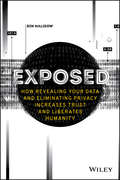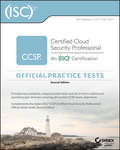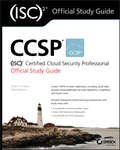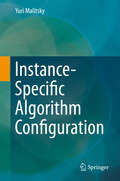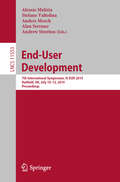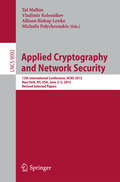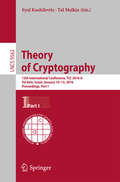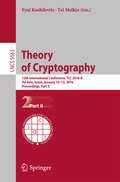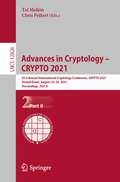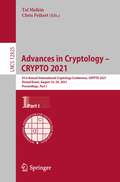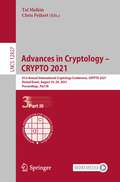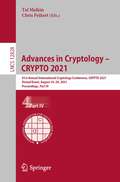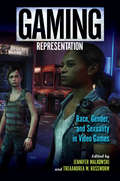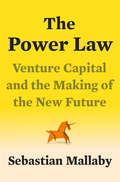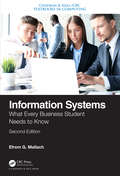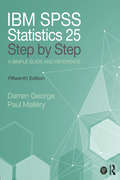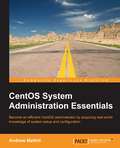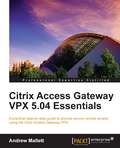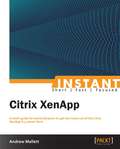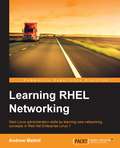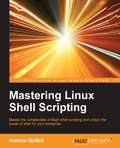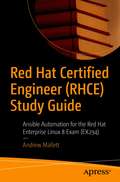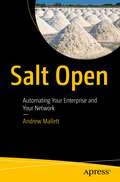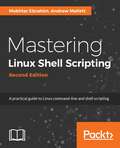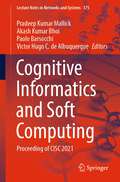- Table View
- List View
Exposed: How Revealing Your Data and Eliminating Privacy Increases Trust and Liberates Humanity
by Ben MalisowDiscover why privacy is a counterproductive, if not obsolete, concept in this startling new book It's only a matter of time-- the modern notion of privacy is quickly evaporating because of technological advancement and social engagement. Whether we like it or not, all our actions and communications are going to be revealed for everyone to see. Exposed: How Revealing Your Data and Eliminating Privacy Increases Trust and Liberates Humanity takes a controversial and insightful look at the concept of privacy and persuasively argues that preparing for a post-private future is better than exacerbating the painful transition by attempting to delay the inevitable. Security expert and author Ben Malisow systematically dismantles common notions of privacy and explains how: Most arguments in favor of increased privacy are wrong Privacy in our personal lives leaves us more susceptible to being bullied or blackmailed Governmental and military privacy leads to an imbalance of power between citizen and state Military supremacy based on privacy is an obsolete concept Perfect for anyone interested in the currently raging debates about governmental, institutional, corporate, and personal privacy, and the proper balance between the public and the private, Exposed also belongs on the shelves of security practitioners and policymakers everywhere.
(ISC)2 CCSP Certified Cloud Security Professional Official Practice Tests
by Ben MalisowThe only official CCSP practice test product endorsed by (ISC)² With over 1,000 practice questions, this book gives you the opportunity to test your level of understanding and gauge your readiness for the Certified Cloud Security Professional (CCSP) exam long before the big day. These questions cover 100% of the CCSP exam domains, and include answers with full explanations to help you understand the reasoning and approach for each. Logical organization by domain allows you to practice only the areas you need to bring you up to par, without wasting precious time on topics you’ve already mastered. As the only official practice test product for the CCSP exam endorsed by (ISC)², this essential resource is your best bet for gaining a thorough understanding of the topic. It also illustrates the relative importance of each domain, helping you plan your remaining study time so you can go into the exam fully confident in your knowledge. When you’re ready, two practice exams allow you to simulate the exam day experience and apply your own test-taking strategies with domains given in proportion to the real thing. The online learning environment and practice exams are the perfect way to prepare, and make your progress easy to track.
CCSP (ISC)2 Certified Cloud Security Professional Official Study Guide
by Ben Malisow O'HaraThe only official study guide for the new CCSP exam CCSP (ISC)2 Certified Cloud Security Professional Official Study Guide is your ultimate resource for the CCSP exam. As the only official study guide reviewed and endorsed by (ISC)2, this guide helps you prepare faster and smarter with the Sybex study tools that include pre-test assessments that show you what you know, and areas you need further review. Objective maps, exercises, and chapter review questions help you gauge your progress along the way, and the Sybex interactive online learning environment includes access to a PDF glossary, hundreds of flashcards, and two complete practice exams. Covering all CCSP domains, this book walks you through Architectural Concepts and Design Requirements, Cloud Data Security, Cloud Platform and Infrastructure Security, Cloud Application Security, Operations, and Legal and Compliance with real-world scenarios to help you apply you skills along the way. The CCSP is the latest credential from the (ISC)2 and the Cloud Alliance, designed to show employers that you have what it takes to keep their organization safe in the cloud. Learn the skills you need to be confident on exam day and beyond. Review 100% of all CCSP exam objectives Practice applying essential concepts and skills Access the industry-leading online study tool set Test your knowledge with bonus practice exams and more As organizations become increasingly reliant on cloud-based IT, the threat to data security looms larger. Employers are seeking qualified professionals with a proven cloud security skillset, and the CCSP credential brings your resume to the top of the pile. CCSP (ISC)2 Certified Cloud Security Professional Official Study Guide gives you the tools and information you need to earn that certification, and apply your skills in a real-world setting.
Instance-Specific Algorithm Configuration
by Yuri MalitskyThis book presents a modular and expandable technique in the rapidly emerging research area of automatic configuration and selection of the best algorithm for the instance at hand. The author presents the basic model behind ISAC and then details a number of modifications and practical applications. In particular, he addresses automated feature generation, offline algorithm configuration for portfolio generation, algorithm selection, adaptive solvers, online tuning, and parallelization. The author's related thesis was honorably mentioned (runner-up) for the ACP Dissertation Award in 2014, and this book includes some expanded sections and notes on recent developments. Additionally, the techniques described in this book have been successfully applied to a number of solvers competing in the SAT and MaxSAT International Competitions, winning a total of 18 gold medals between 2011 and 2014. The book will be of interest to researchers and practitioners in artificial intelligence, in particular in the area of machine learning and constraint programming.
End-User Development: 7th International Symposium, IS-EUD 2019, Hatfield, UK, July 10–12, 2019, Proceedings (Lecture Notes in Computer Science #11553)
by Alessio Malizia Stefano Valtolina Anders Morch Alan Serrano Andrew StrattonThis book constitutes the refereed proceedings of the 7th International Symposium on End-User Development, IS-EUD 2017, held in Hatfield, UK, in July 2019. The 9 full papers and 8 short papers presented were carefully reviewed and selected from 35 submissions. The papers discuss progress in research around end-user development through, or towards, methods, socio-technical environments, intelligent agents, as well as the most effective end-user programming paradigms for smart environments. Papers and submissions in all categories addressed this specific theme together with topics that have been traditionally covered by the broader themes of end-user development, such as domain specific tools, spreadsheets, educational applications, and end user aspects.
Applied Cryptography and Network Security: 13th International Conference, ACNS 2015, New York, NY, USA, June 2-5, 2015, Revised Selected Papers (Lecture Notes in Computer Science #9092)
by Tal Malkin Vladimir Kolesnikov Allison Bishop Lewko Michalis PolychronakisThis book constitutes the refereed proceedings of the 13th International Conference on Applied Cryptography and Network Security, ACNS 2015, held in New York, NY, USA, in June 2015. The 33 revised full papers included in this volume and presented together with 2 abstracts of invited talks, were carefully reviewed and selected from 157 submissions. They are organized in topical sections on secure computation: primitives and new models; public key cryptographic primitives; secure computation II: applications; anonymity and related applications; cryptanalysis and attacks (symmetric crypto); privacy and policy enforcement; authentication via eye tracking and proofs of proximity; malware analysis and side channel attacks; side channel countermeasures and tamper resistance/PUFs; and leakage resilience and pseudorandomness.
Theory of Cryptography
by Tal Malkin Eyal KushilevitzThe two-volume set LNCS 9562 and LNCS 9563 constitutes the refereed proceedings of the 13th International Conference on Theory of Cryptography, TCC 2016, held in Tel Aviv, Israel, in January 2016. The 45 revised full papers presented were carefully reviewed and selected from 112 submissions. The papers are organized in topical sections on obfuscation, differential privacy, LWR and LPN, public key encryption, signatures, and VRF, complexity of cryptographic primitives, multiparty computation, zero knowledge and PCP, oblivious RAM, ABE and IBE, and codes and interactive proofs. The volume also includes an invited talk on cryptographic assumptions.
Theory of Cryptography
by Tal Malkin Eyal KushilevitzThe two-volume set LNCS 9562 and LNCS 9563 constitutes the refereed proceedings of the 13th International Conference on Theory of Cryptography, TCC 2016, held in Tel Aviv, Israel, in January 2016. The 45 revised full papers presented were carefully reviewed and selected from 112 submissions. The papers are organized in topical sections on obfuscation, differential privacy, LWR and LPN, public key encryption, signatures, and VRF, complexity of cryptographic primitives, multiparty computation, zero knowledge and PCP, oblivious RAM, ABE and IBE, and codes and interactive proofs. The volume also includes an invited talk on cryptographic assumptions.
Advances in Cryptology – CRYPTO 2021: 41st Annual International Cryptology Conference, CRYPTO 2021, Virtual Event, August 16–20, 2021, Proceedings, Part II (Lecture Notes in Computer Science #12826)
by Tal Malkin Chris PeikertThe four-volume set, LNCS 12825, LNCS 12826, LNCS 12827, and LNCS 12828, constitutes the refereed proceedings of the 41st Annual International Cryptology Conference, CRYPTO 2021. Crypto has traditionally been held at UCSB every year, but due to the COVID-19 pandemic it was an online event in 2021.The 103 full papers presented in the proceedings were carefully reviewed and selected from a total of 426 submissions. The papers are organized in the following topical sections: Part I: Award Papers; Signatures; Quantum Cryptography; Succinct Arguments. Part II: Multi-Party Computation; Lattice Cryptography; and Lattice Cryptanalysis. Part III: Models; Applied Cryptography and Side Channels; Cryptanalysis; Codes and Extractors; Secret Sharing. Part IV: Zero Knowledge; Encryption++; Foundations; Low-Complexity Cryptography; Protocols.
Advances in Cryptology – CRYPTO 2021: 41st Annual International Cryptology Conference, CRYPTO 2021, Virtual Event, August 16–20, 2021, Proceedings, Part I (Lecture Notes in Computer Science #12825)
by Tal Malkin Chris PeikertThe four-volume set, LNCS 12825, LNCS 12826, LNCS 12827, and LNCS 12828, constitutes the refereed proceedings of the 41st Annual International Cryptology Conference, CRYPTO 2021. Crypto has traditionally been held at UCSB every year, but due to the COVID-19 pandemic it was an online event in 2021.The 103 full papers presented in the proceedings were carefully reviewed and selected from a total of 426 submissions. The papers are organized in the following topical sections: Part I: Award Papers; Signatures; Quantum Cryptography; Succinct Arguments. Part II: Multi-Party Computation; Lattice Cryptography; and Lattice Cryptanalysis. Part III: Models; Applied Cryptography and Side Channels; Cryptanalysis; Codes and Extractors; Secret Sharing. Part IV: Zero Knowledge; Encryption++; Foundations; Low-Complexity Cryptography; Protocols.
Advances in Cryptology – CRYPTO 2021: 41st Annual International Cryptology Conference, CRYPTO 2021, Virtual Event, August 16–20, 2021, Proceedings, Part III (Lecture Notes in Computer Science #12827)
by Tal Malkin Chris PeikertThe four-volume set, LNCS 12825, LNCS 12826, LNCS 12827, and LNCS 12828, constitutes the refereed proceedings of the 41st Annual International Cryptology Conference, CRYPTO 2021. Crypto has traditionally been held at UCSB every year, but due to the COVID-19 pandemic it was an online event in 2021.The 103 full papers presented in the proceedings were carefully reviewed and selected from a total of 426 submissions. The papers are organized in the following topical sections: Part I: Award Papers; Signatures; Quantum Cryptography; Succinct Arguments. Part II: Multi-Party Computation; Lattice Cryptography; and Lattice Cryptanalysis. Part III: Models; Applied Cryptography and Side Channels; Cryptanalysis; Codes and Extractors; Secret Sharing. Part IV: Zero Knowledge; Encryption++; Foundations; Low-Complexity Cryptography; Protocols.
Advances in Cryptology – CRYPTO 2021: 41st Annual International Cryptology Conference, CRYPTO 2021, Virtual Event, August 16–20, 2021, Proceedings, Part IV (Lecture Notes in Computer Science #12828)
by Tal Malkin Chris PeikertThe four-volume set, LNCS 12825, LNCS 12826, LNCS 12827, and LNCS 12828, constitutes the refereed proceedings of the 41st Annual International Cryptology Conference, CRYPTO 2021. Crypto has traditionally been held at UCSB every year, but due to the COVID-19 pandemic it was an online event in 2021.The 103 full papers presented in the proceedings were carefully reviewed and selected from a total of 426 submissions. The papers are organized in the following topical sections: Part I: Award Papers; Signatures; Quantum Cryptography; Succinct Arguments. Part II: Multi-Party Computation; Lattice Cryptography; and Lattice Cryptanalysis. Part III: Models; Applied Cryptography and Side Channels; Cryptanalysis; Codes and Extractors; Secret Sharing. Part IV: Zero Knowledge; Encryption++; Foundations; Low-Complexity Cryptography; Protocols.
Gaming Representation: Race, Gender, and Sexuality in Video Games
by Jennifer Malkowski Treaandrea M. RusswormRecent years have seen an increase in public attention to identity and representation in video games, including journalists and bloggers holding the digital game industry accountable for the discrimination routinely endured by female gamers, queer gamers, and gamers of color. Video game developers are responding to these critiques, but scholarly discussion of representation in games has lagged far behind. Gaming Representation examines portrayals of race, gender, and sexuality in a range of games, from casuals like Diner Dash, to indies like Journey and The Binding of Isaac, to mainstream games from the Grand Theft Auto, BioShock, Spec Ops, The Last of Us, and Max Payne franchises. Arguing that representation and identity function as systems in games that share a stronger connection to code and platforms than it may first appear, the contributors to this volume push gaming scholarship to new levels of inquiry, theorizing, and imagination.
The Power Law: Venture Capital and the Making of the New Future
by Sebastian Mallaby"A rare and unsettling look inside a subculture of unparalleled influence.&” —Jane Mayer"A classic...A book of exceptional reporting, analysis and storytelling.&” —Charles DuhiggFrom the New York Times bestselling author of More Money Than God comes the astonishingly frank and intimate story of Silicon Valley&’s dominant venture-capital firms—and how their strategies and fates have shaped the path of innovation and the global economyInnovations rarely come from &“experts.&” Elon Musk was not an &“electric car person&” before he started Tesla. When it comes to improbable innovations, a legendary tech VC told Sebastian Mallaby, the future cannot be predicted, it can only be discovered. It is the nature of the venture-capital game that most attempts at discovery fail, but a very few succeed at such a scale that they more than make up for everything else. That extreme ratio of success and failure is the power law that drives the VC business, all of Silicon Valley, the wider tech sector, and, by extension, the world. In The Power Law, Sebastian Mallaby has parlayed unprecedented access to the most celebrated venture capitalists of all time—the key figures at Sequoia, Kleiner Perkins, Accel, Benchmark, and Andreessen Horowitz, as well as Chinese partnerships such as Qiming and Capital Today—into a riveting blend of storytelling and analysis that unfurls the history of tech incubation, in the Valley and ultimately worldwide. We learn the unvarnished truth, often for the first time, about some of the most iconic triumphs and infamous disasters in Valley history, from the comedy of errors at the birth of Apple to the avalanche of venture money that fostered hubris at WeWork and Uber. VCs&’ relentless search for grand slams brews an obsession with the ideal of the lone entrepreneur-genius, and companies seen as potential &“unicorns&” are given intoxicating amounts of power, with sometimes disastrous results. On a more systemic level, the need to make outsized bets on unproven talent reinforces bias, with women and minorities still represented at woefully low levels. This does not just have social justice implications: as Mallaby relates, China&’s homegrown VC sector, having learned at the Valley&’s feet, is exploding and now has more women VC luminaries than America has ever had. Still, Silicon Valley VC remains the top incubator of business innovation anywhere—it is not where ideas come from so much as where they go to become the products and companies that create the future. By taking us so deeply into the VCs&’ game, The Power Law helps us think about our own future through their eyes.
Information Systems: What Every Business Student Needs to Know, Second Edition (Chapman & Hall/CRC Textbooks in Computing)
by Efrem G. MallachMost information systems textbooks overwhelm business students with overly technical information they may not need in their careers. This textbook takes a new approach to the required information systems course for business majors. For each topic covered, the text highlights key "Take-Aways" that alert students to material they will need to remember during their careers. Sections titled "Where You Fit In" and "Why This Chapter Matters" explain how the topics being covered will impact students on the job. Review questions, discussion questions, and summaries are also included. This second edition is updated to include new technology, along with a new running case study. Key features: Single-mindedly for business students who are not technical specialists Doesn&’t try to prepare IS professionals; other courses will do that Stresses the enabling technologies and application areas that matter the most today Based on the author&’s real-world experience Up to date regarding technology and tomorrow&’s business needs This is the book the author—and, more importantly, his students—wishes he had when he started teaching. Dr. Mallach holds degrees in engineering from Princeton and MIT, and in business from Boston University. He worked in the computer industry for two decades, as Director of Strategic Planning for a major computer firm and as co-founder/CEO of a computer marketing consulting firm. He taught information systems in the University of Massachusetts (Lowell and Dartmouth) business schools for 18 years, then at Rhode Island College following his retirement. He consults in industry and serves as Webmaster for his community, in between hiking and travel with his wife.
IBM SPSS Statistics 25 Step by Step: A Simple Guide and Reference
by Paul Mallery Darren GeorgeIBM SPSS Statistics 25 Step by Step: A Simple Guide and Reference, fifteenth edition, takes a straightforward, step-by-step approach that makes SPSS software clear to beginners and experienced researchers alike. Extensive use of four-color screen shots, clear writing, and step-by-step boxes guide readers through the program. Exercises at the end of each chapter support students by providing additional opportunities to practice using SPSS. This book covers both the basics of descriptive statistical analysis using SPSS through to more advanced topics such as multiple regression, multidimensional scaling and MANOVA, including instructions for Windows and Mac. This makes it ideal for both undergraduate statistics courses and for postgraduates looking to further develop their statistics and SPSS knowledge. New to this edition: Updated throughout to SPSS 25 Updated / restructured material on: Chart Builder; Univariate ANOVA; moderation on two- and three-way ANOVA; and Factor Analytic Techniques (formerly Factor Analysis structure) New material on computing z and T scores, and on computing z scores within descriptive statistics Clearer in-chapter links between the type of data and type of research question that the procedure can answer Updated / additional datasets, exercises, and expanded Companion Website material, including Powerpoint slides for instructors
CentOS System Administration Essentials
by Andrew MallettIf you are a Linux administrator who is looking to gain knowledge that differentiates yourself from the crowd, then this is the book for you. Beginners who have a keen interest to learn more about Linux administration will also progress quickly with this resourceful learning guide.
Citrix Access Gateway VPX 5.04 Essentials
by Andrew MallettThis book is written in an easy-to-read style, with a strong emphasis on real-world, practical examples. Step-by-step explanations are provided for performing important tasks. If you an administrator or IT professional looking for basic knowledge of Citrix products such as XenApp (or its predecessor: Presentation Server), or XenDesktop and remote access solution, then this is the best guide for you. This will help you with the basic premise of why we need to implement the ICA Proxy for remote access. You may then note the benefits of full VPN access, but no prior experience with Virtual Private Networks is required as we step you through this, although basic networking and routing experience would not go awry here.
Instant Citrix XenApp
by Andrew MallettGet to grips with a new technology, understand what it is and what it can do for you, and then get to work with the most important features and tasks. This book is a great tool to quickly learn and explore the features offered by XenApp 6.5.Windows system administrators who want a quick lesson on how to install and configure XenApp.
Learning RHEL Networking
by Andrew MallettThis book is ideal for administrators who need to learn the networking abilities of Red Hat Enterprise Linux 7. You may not be a Linux administrator already, but you will need to be able to test files in Linux and navigate the filesystem.
Mastering Linux Shell Scripting
by Andrew MallettMaster the complexities of Bash shell scripting and unlock the power of shell for your enterprise About This Book * Identify the high level steps such as verifying user input, using command lines and conditional statements in creating and executing simple shell scripts * Create and edit dynamic shell scripts to manage complex and repetitive tasks * Learn about scripting in Perl and programming in Python as a BASH scripting alternative with this practical, step-by-step guide Who This Book Is For Mastering Linux Shell Scripting has been written for Linux administrators who want to automate tasks in their daily lives, saving time and effort. You'll need to have command-line experience and be familiar with the tasks that you need to automate. What You Will Learn * Use the type command to identify the order of command evaluation * Create interactive scripts that prompt for user input * Foster menu structures for operators with little command-line experience * Develop scripts that dynamically edit web configuration files to produce a new virtual host * Write scripts that use AWK to search and reports on log files * Draft effective scripts using functions as building blocks, reducing maintenance and build time * Make informed choices by comparing different script languages such as Perl and Python with BASH In Detail Shell scripting is a quick method to prototype a complex application or a problem by automating tasks when working on Linux-based systems. Using both simple one-line commands and command sequences complex problems can be solved with ease, from text processing to backing up sysadmin tools. In this book, you'll discover everything you need to know to master shell scripting and make informed choices about the elements you employ. Get to grips with the fundamentals of creating and running a script in normal mode, and in debug mode. Learn about various conditional statements' code snippets, and realize the power of repetition and loops in your shell script. Implement functions and edit files using the Stream Editor, script in Perl, program in Python - as well as complete coverage of other scripting languages to ensure you can choose the best tool for your project. Style and approach The book will capture your attention and keep you engaged with the simplicity and clarity of each explanation. Every step is accompanied with screen captures so you can cross-check the results before moving on.
Red Hat Certified Engineer (RHCE) Study Guide: Ansible Automation for the Red Hat Enterprise Linux 8 Exam (EX294)
by Andrew MallettStudy the material in this book to prepare for the RHCE exam EX294 and to learn how using Ansible within your own environment improves system administration productivity.This book covers all of the objectives of the exam and extends further, ensuring that you know how to use Ansible to manage Linux. The book uses CentOS, a Red Hat-based distribution, and Ubuntu instead of using a single Red Hat distribution. By using the two distributions, you will understand the power of Ansible and how easily you can deal with multiple platforms, which is crucial for your understanding of Ansible in the real world. The book assumes no previous knowledge of Ansible but some knowledge of Linux system administration from the command line. You will learn how to manage Linux systems that are installed with different distributions, including CentOS Enterprise Linux 8 and Ubuntu 18.04. You will be able to manage these systems using ad hoc commands from the command line as well as creating Ansible playbooks that can be replayed reliably many times. To save on the code that you have to create, you will learn how to use Ansible Galaxy to search for and download roles and collections that are pre-written to manage elements of your Linux installations. By the end of this book, you will be able to write efficient and effective YAML playbooks to manage your entire estate.What You Will Learn Prepare systems so that password-less access can be used with Ansible remotely Use ad hoc commands to quickly configure systems Use and format YAML files correctly Create playbooks that grow in their complexity as your experience develops Ensure that services are restarted on configuration changesWho This Book Is ForThose who want to prepare for the RHCE exam EX294 and readers who want to learn how to use Ansible to improve the productivity of their system administration. This book will help you prepare yourself for the exam as well as your real-life administration needs.
Salt Open: Automating Your Enterprise and Your Network
by Andrew MallettThere is a rapid growth of automation in server rooms and data centers. The days of having many administrators running around busily configuring and maintaining servers are gone and have been replaced with droves of Salt-Minions; agents beavering away on the target nodes ensuring the configuration is as specified. This book covers Salt Open (also known as SaltStack Open) from the ground up and shows you how to work with two Linux distributions.You'll see how Salt Open is duplicated with ArubaOS and IOS networking devices, which can be configured without the underlying OS. As you step through the configuration options, you'll learn how to run remote execution modules from the CLI before looking at stateful configuration using SLS files. Moving on, you'll learn how to configure the systems where you also need to monitor your devices and that is when reactors and beacons come into play. Creating beacons to alert the server when thresholds are exceeded, you will be able to create reactors to mitigate the issues identified by the beacons.By the end of this book, you will be able to deploy Salt to your servers and network infrastructure. You will be able to install the Salt-Master and Salt-Minion, executing commands from both the Master and the Minion. The networking devices you need to manage will be controlled through the Salt_Proxy Minions that you have configured. Finally, you will be able to load-balance connections to the master with Salt-Syndic. What You'll Learn Install Salt Services on Ubuntu and CentOS based systems Work with remote execution modules Format YAML files correctly Provide defined configuration using state files Use Salt-Proxy to configure network devicesAutomate the configuration of Linux servers and networking devicesAdd value for both the server and network automation team Who This Book Is ForSystem administrators experienced in Linux administration, who desire to expand their horizons into the world of automation, moving from scripts to states.
Mastering Linux Shell Scripting,: A practical guide to Linux command-line, Bash scripting, and Shell programming, 2nd Edition
by Andrew Mallett Mokhtar EbrahimMaster the complexities of Bash shell scripting and unlock the power of shell for your enterpriseKey FeaturesIdentify high-level steps such as verifying user inputUsing the command line and conditional statements in creating/executing simple shell scriptsCreate and edit dynamic shell scripts to manage complex and repetitive tasksLeverage the command-line to bypass GUI and automate common tasksBook DescriptionIn this book, you’ll discover everything you need to know to master shell scripting and make informed choices about the elements you employ.Grab your favorite editor and start writing your best Bash scripts step by step. Get to grips with the fundamentals of creating and running a script in normal mode, and in debug mode. Learn about various conditional statements' code snippets, and realize the power of repetition and loops in your shell script. You will also learn to write complex shell scripts. This book will also deep dive into file system administration, directories, and system administration like networking, process management, user authentications, and package installation and regular expressions. Towards the end of the book, you will learn how to use Python as a BASH Scripting alternative. By the end of this book, you will know shell scripts at the snap of your fingers and will be able to automate and communicate with your system with keyboard expressions.What you will learnMake, execute, and debug your first Bash scriptCreate interactive scripts that prompt for user inputFoster menu structures for operators with little command-line experienceDevelop scripts that dynamically edit web configuration files to produce a new virtual host Write scripts that use AWK to search and reports on log filesDraft effective scripts using functions as building blocks, reducing maintenance and build timeMake informed choices by comparing different script languages such as Python with BASHWho this book is forIf you are a Linux administrator or a system administrator and are interested in automating tasks in your daily lives, saving time and effort, this book is for you. Basic shell scripting and command-line experience will be required. Familiarity with the tasks you need to automate will be helpful.
Cognitive Informatics and Soft Computing: Proceeding of CISC 2021 (Lecture Notes in Networks and Systems #375)
by Pradeep Kumar Mallick Akash Kumar Bhoi Paolo Barsocchi Victor Hugo C. de AlbuquerqueThis book presents best selected research papers presented at the 4th International Conference on Cognitive Informatics and Soft Computing (CISC 2021), held at Balasore College of Engineering & Technology, Balasore, Odisha, India, from 21–22 August 2021. It highlights, in particular, innovative research in the fields of cognitive informatics, cognitive computing, computational intelligence, advanced computing, and hybrid intelligent models and applications. New algorithms and methods in a variety of fields are presented, together with solution-based approaches. The topics addressed include various theoretical aspects and applications of computer science, artificial intelligence, cybernetics, automation control theory, and software engineering.
